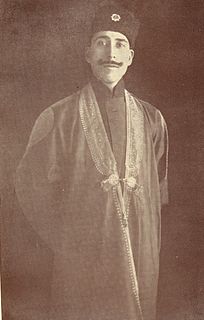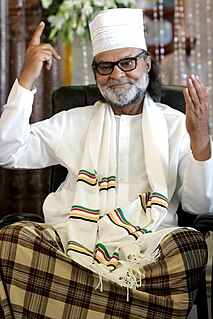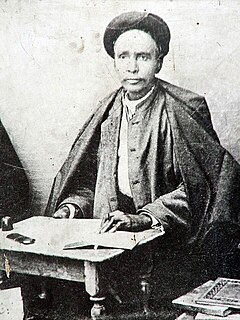
Deobandi is a revivalist movement within Sunni Islam. It is centered in India, Pakistan, Afghanistan, and Bangladesh, has spread to the United Kingdom, and has a presence in South Africa. The name derives from Deoband, India, where the school Darul Uloom Deoband is situated. The movement was inspired by scholar Shah Waliullah Dehlawi (1703–1762), and was founded in 1867 in the wake of the First War of Indian Independence in northern India a decade earlier.

Syed Abdullah Shah Qadri, popularly known as Bulleh Shah, was a Mughal-era Punjabi Islamic philosopher and Sufi poet. His first spiritual teacher was Shah Inayat Qadiri, a Sufi murshid of Lahore.
Islamic music may refer to religious music, as performed in Islamic public services or private devotions, or more generally to musical traditions of the Muslim world. The classic heartland of Islam is the Middle East, North Africa, the Horn of Africa, Iran, Central Asia and South Asia, and it also included the medieval Iberian peninsula (al-Andalus). Due to Islam being a multi-ethnic religion, the musical expression of its adherents is vastly diverse. Indigenous traditions of various part have influenced the musical styles popular among Muslims today.

Barelvi is a movement following the Sunni Hanafi school of jurisprudence, with over 200 million followers in South Asia. The name derives from the north Indian town of Bareilly, the hometown of its founder and main leader Ahmed Raza Khan (1856–1921). Although Barelvi is the commonly used term in the media and academia, the followers of the movement often prefer to be known by the title of Ahle Sunnat wa Jama'at, or as Sunnis, a reference to their perception as forming an international majority movement.
Baba Shah Inayat Qadiri Shatari (Punjabi: شاه عنایت قادري , also called Enayat Shah was a Sufi scholar and saint of the Qadiri-Shatari silsila.

Sachal Sarmast (1739–1827) was a Sufi poet from Sindh in modern-day Pakistan.
Sufi music is the devotional music of the Sufis, inspired by the works of Sufi poets, like Rumi, Hafiz, Bulleh Shah, Amir Khusrow and Khwaja Ghulam Farid.

Sirdar Ikbal Ali Shah was an Indian-Afghan author and diplomat descended from the Sadaat of Paghman. Educated in India, he came to Britain as a young man to continue his education in Edinburgh, where he married a young Scotswoman.
Mir Sayyid Ali Hamadani was a Persian Sūfī of the Kubrawiya order, a poet and a prominent Muslim scholar. He was born in Hamadan, and was buried in Khatlan Tajikistan. He was known as Shāh-e-Hamadān, Amīr-i Kabīr, and Ali Sani.
Sufism has a history in India evolving for over 1,000 years. The presence of Sufism has been a leading entity increasing the reaches of Islam throughout South Asia. Following the entrance of Islam in the early 8th century, Sufi mystic traditions became more visible during the 10th and 11th centuries of the Delhi Sultanate and after it to the rest of India. A conglomeration of four chronologically separate dynasties, the early Delhi Sultanate consisted of rulers from Turkic and Afghan lands. This Persian influence flooded South Asia with Islam, Sufi thought, syncretic values, literature, education, and entertainment that has created an enduring impact on the presence of Islam in India today. Sufi preachers, merchants and missionaries also settled in coastal Bengal and Gujarat through maritime voyages and trade.
International Association of Sufism (IAS) is a California nonprofit organization headquartered in Marin County. IAS is a United Nations' NGO/DPI and the first organization established to organize an inclusive forum that opens a line of communication among Sufis all around the world. IAS launched a global intra-faith movement among Sufis and Sufi Schools reaching from the borders of Indonesia to the Coasts of West Africa.
"Bulleya" is a song by the Pakistani sufi rock band Junoon, released in 1999. It is the first track from the band's fifth album, Parvaaz (1999), recorded at Abbey Road Studios, London and released on EMI Records. The song is a famous kafi written by the sufi saint Bulleh Shah. Bulleh Shah is famous for his spiritual and metaphysical poetry, and Bullah Ki Jaana is one of his well-known poems. The song is composed and produced by lead guitarist and founder of the band Salman Ahmad. It is the lead single on the album, the song uses blending of rock guitars and bluesy vocals with eastern elements like the use of tablas, raga-inspired melodies and traditional Pakistani folk music.
Muhammad Shah or Mohammad Shah may refer to:

Sufism has an illustrious history in Pakistan and the greater South Asia region, evolving for over 1,000 years. Today, there are thousands of Sufi shrines and mausoleums which dot the landscape of Pakistan.
Ameer e Millat Al Haj Hafiz Pir Syed Jamaat Ali Shah Sahib Muhaddith Alipuri ( 1834–1951) born in Alipur Sharif Dist, Sialkot, Pakistan was a Naqshbandi Sufi Saint and mass leader of traditional Barelvi Muslims of south Asia. He was President of Sunni Barelvi organisation All India Sunni Conference and was main leader in Shaheed Ganj Mosque. Through his standing among the Sunni Sufi followers he gave his open support to Pakistan Movement and therefore one of the prime religious leader of Pakistan Movement
Sufism in Bangladesh is more or less similar to that in the whole Indian subcontinent. India, it is claimed, is one of the five great centers of Sufism, the other four being Persia, Baghdad, Syria, and North Africa. Sufi saints flourished in Hindustan (India) preaching the mystic teachings of Sufism that easily reached the common people, especially, the spiritual truth seekers in India. Sufism in Bangladesh is also called pirism, after the pirs or teachers in the Sufi tradition.
Persecution of Sufis and Sufism has included destruction of Sufi shrines and mosques, suppression of orders, murder, and discrimination against adherents in a number of Muslim-majority countries. The Turkish Republican state banned all Sufi orders and abolished their institutions in 1925 after Sufis opposed the new secular order. The Iranian Islamic Republic has harassed Shia Sufis, reportedly for their lack of support for the government doctrine of "governance of the jurist".

Muhammad Azmat Ullah Shah was a Sufi spiritual leader and an officer in the Pakistani Army. He was a follower of Mohammad Naqeeb Ullah, and later a leader of the Naqeebi spiritual chain.









